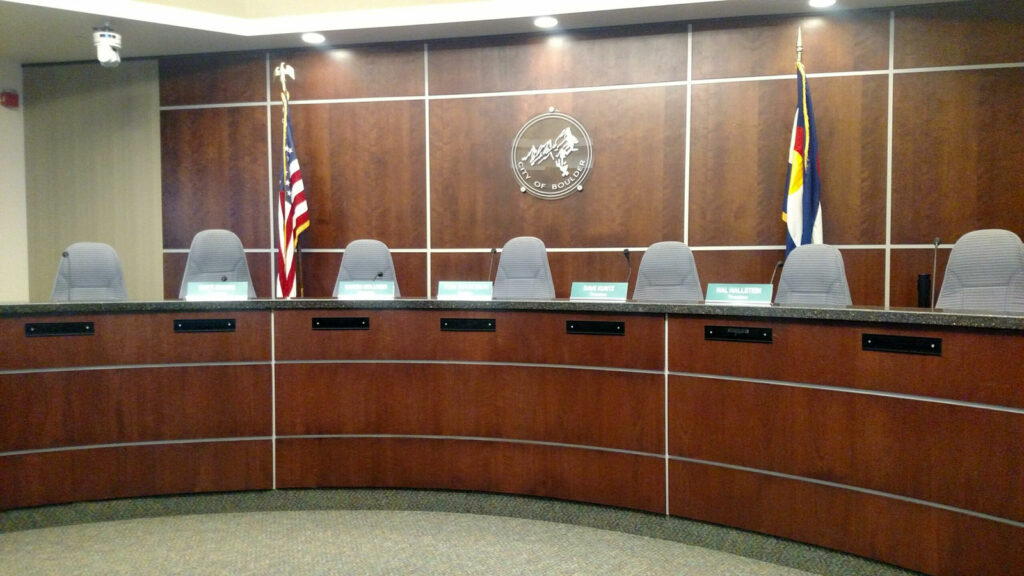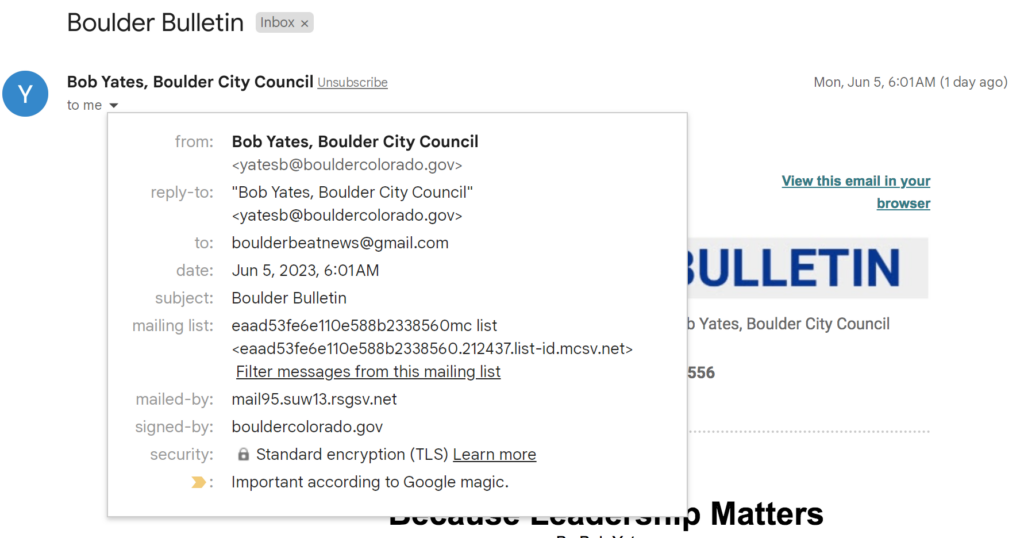Is the rash of recent complaints an attempt to thwart democracy — or an important part of the process?

Friday, June 2, 2023 (Updated Saturday, June 3)
A version of this article was originally published in Boulder Weekly
Boulderites have been griping about the local government since time immemorial. But official complaints — submitted with a signed affidavit and required, by law, to be investigated by in-house attorneys or independent counsel — have been relatively rare in recent years.
City Council went years with only the odd complaint, weathering numerous political storms. Even an ill-advised reference to the Holocaust by an elected official drew no formal censure; remonstrances were limited to speeches, op-eds an angry emails.
That changed last year, when grievances started rolling in. Since mid-January, the city has fielded 10 official complaints — and they haven’t stopped yet.
The tsunami has led elected officials to suggest the complaint process needs tweaking. Community members, including those who have filed recent complaints, say the uptick reflects the city’s wanton disregard for its own rules and its leaders political naivety.
As Boulder’s city council contemplates change, they will have to achieve a delicate balance, crafting a complaint process that works as an open, accessible avenue for accountability but can’t be abused by disgruntled residents to dispatch decisions they disagree with.
Five down, three to go
Half the complaints filed this year were related to the (by now) well-detailed appointment of Lisa Sweeney-Miran to Boulder’s Police Oversight Panel (POP). Two were dismissed as meritless; two were upheld, resulting in the removal of Sweeney-Miran from the group, which then ceased review of new cases in protest.
The only outstanding complaint involves uniformed Boulder police officers attending a city council discussion about Sweeney-Miran, a possible violation of BPD policy. That is being investigated internally by the department’s Police Standards Unit.
Max Weller, a formerly unhoused man who resides in a residential care facility, on May 19 notified the city of his intent to file a complaint against members of the Police Oversight Panel for their partial work stoppage, he said. The complaint was accepted after some back-and-forth with city officials, Weller said; the city previously declined to certify an emailed complaint, as the process requires it to be certified in person. Weller lives in a residential care facility and has mobility challenges.
One of the people who helped select Sweeney-Miran filed a lawsuit this week, after this article was initially published. Jude Landsman, from Boulder County’s NAACP branch, alleges that the city violated her due process rights “and abused its authority when it illegally dismantled the hard work of the Police Oversight Panel Selection Committee,” her lawyer wrote in a news release.
Non-POP complaints were miscellaneous. Council member Nicole Speer drew two, both tossed out, for testifying at the statehouse in support of safe drug-use sites. Her colleague Matt Benjamin was accused of harassing and intimidating a woman who attempted to publish a photo of his house to social media site NextDoor. (The home turned out to be a neighbor’s.) That was thrown out, as his accuser does not reside in Boulder. (Complainants must live in the city.)
Two complaints are still outstanding, their substance related to matters that pre-date the POP drama — proof, some say, that the system is working as intended.
This news doesn’t write itself. Throw us some cash so we can stay 100% independent and reader-supported.
Governance Aaron Brockett Bob Yates Boulder Boulder Valley School District Boulder Weekly BVSD city council city of Boulder code of conduct complaints email ethics factor Lauren Folkerts Matt Benjamin modular homes newsletter Nextdoor Nicole Speer Police Oversight Panel police reform policing POP privacy Rachel Friend Tara Winer
‘The new M.O.’
The first concerns a planned modular home factory, a multi-year project pursued by the city and Flatirons Habitat for Humanity. The facility will assemble modular houses to replace aging and energy inefficient mobile homes in the Ponderosa Community.
Resident opposition began almost as soon as Boulder announced the site last fall: a Boulder Valley School District (BVSD) property on 63rd and Arapahoe, home to the district’s food production facility, Technical Education Center and Arapahoe Ridge High School. A lawsuit was filed in February, and in late April, an official complaint followed.
The complaint names three city staff, accusing them of improperly representing BVSD and the city at a hearing (senior planner Jay Sugnet) and misrepresenting facts about an environmental review (Shelly Conley and Kristin Hyser, both in the city’s housing department at the time; Hyser has since been named executive director of Broomfield Housing Authority).
Given the involvement of city staff, an outside attorney was appointed to investigate. David Vogel will charge the city $250 per hour, up to $10,000, to review the complaint, according to a city spokesperson.
A complaint against councilman Bob Yates will also receive an independent look, though no one has been contracted yet.
The complaint revolves around Yates’ newsletter, Boulder Bulletin — distributed via Mailchimp, using his official city email — alleging Yates violates the city’s privacy policy by automatically subscribing people who email city council.

This is not the first time residents have questioned Yates’ practices. While his colleagues debated the content of his newsletter in July 2022, residents at the time told Boulder Beat they had started receiving Boulder Bulletin after emailing city council.
City attorneys at the time declined to comment on the matter, though former City Attorney Tom Carr told Boulder Beat it was “perfectly legal” to populate a mailing list with the email addresses of residents who contact the city, because communications to council are public record.
Yet an open record request by residents for the same email addresses were denied under the city’s privacy policies, according to the complaint. Open records also revealed a request from an election campaign group, Keep Our Libraries, for Yates to share his mailing list.
Yates, who has twice declined to be interviewed on this subject, denied that he shared his contact list with the Keep Our Libraries campaign. He characterized the complaint as a political tactic, lumping it in with all the others.
“Code of conduct complaints seems to be the new M.O. for people who don’t like what a council member says or does, or how they vote, regardless of the law or ethics,” Yates wrote in response to a request for comment. “That’s a bit concerning, regardless of who the complaints are filed against.”
‘Clearly broken’
The day after Boulder Beat contacted Yates about the complaint against him, he sent a Hotline post (the public email service used by city officials) lamenting the “rash of complaints” and calling for reform to prevent complaints intended “to stifle or intimidate” city leaders and employees.
“In addition to the intimidation and embarrassment imposed on the subject of a complaint,” Yates wrote, “a complaint takes significant resources away from the city attorney’s office as they deal with each complaint that is filed.”
Boulder spent $20,000 investigating four of the five police oversight-related complaints. And while staff time is not being tracked, the city attorney’s office estimates it has spent “about 60 hours of time for attorneys and their team, in addition to time by the city clerk and her office,” city spokesperson Sarah Huntley wrote in response to emailed questions.
Members of the POP also noted the very public criticism faced by Sweeney-Miran, as well as fears that they might draw their own complaints.
“Do I want to voice my opinion, and then city council puts me on the spot like Lisa was?” Maria-Soledad Diaz said at POP’s May 10 meeting. “As a woman of color, I don’t want to be there.”
“Let them file more complaints,” Sam Zhang said. “The complaint process is clearly broken. There will be complaints no matter what. That is the city’s problem.”
‘Muck in the gears’
Several members share Yates’ concern about the money and time being expended on complaints. Mayor Aaron Brockett, Rachel Friend, Tara Winer, Lauren Folkerts and Matt Benjamin responded to requests from Boulder Beat to discuss possible changes; all said they’d like more vetting before an investigation is required.
Drawing those lines will be tricky, and will need heavy involvement from city attorneys. Unless there is “low-hanging fruit” like language changes, it’s unlikely council will tackle it this year, Benjamin said in an interview. Beyond Yates’ email, council has not yet asked staff to explore the issue further; that would require an informal nod-of-five vote.
One possibility is an external ethics board or commission, which other cities employ. But Boulder is already struggling to recruit civilians to serve on its many resident groups, and said earlier this year it might eliminate some.
“There’s a danger” of being too reactionary to what might be “a temporary fad,” Benjamin said. Although open to pursuing changes, he’s still unsure if the surge in complaints represent legitimate issues with the process or people trying “to throw muck in the gears” of a relatively new, majority-progressive council.
The fact that so few complaints have been upheld might discourage further filings, he said. “Once people realize the futility, it might fade back into the ether.”
Complainants, of course, think their grievances deserve to be judged on their own merit.
“I don’t think you truly give them validation by lumping them and saying, ‘We’ve got complainers,’” said Dana Hessel, who filed the complaint against city staffers over the modular home factory.
“There’s reasons people make complaints,” Hessel said. “You can’t make the complaint process harder. You need to make the adherence to rules, regulations and policies more responsive.”
Kate Lacroix thinks the system is working just fine, despite having her complaint against Benjamin dismissed.
“I think anyone should be free to complain about anything they want,” Lacroix wrote in response to emailed questions. “The city has checks and balances in place to vet claims that don’t meet the standard for further consideration, and I respect this.”
Lacroix attributes the volume of complaints to the city council’s “green bench” of relative political newcomers. If anything, she’d like to see the process made easier for residents to understand, suggesting an FAQ section or instructional video.
“Any language or attitude that promotes making complaining more arduous puts a crimp in a necessary democratic process.”
Author’s note: This article has been updated to add news of Jude Landsman’s lawsuit, developments in Max Weller’s complaint, and to clarify the distribution and source of Yates’ newsletter. After publication, Yates contacted Boulder Beat to specify that his newsletters are distributed via Mailchimp, using his city council email address — which is displayed clearly and prominently in recipient emails as the sender.
— Shay Castle, @shayshinecastle or on Mastodon at toot.bldrweb.org/@shayshinecastle
Help make the Beat better. Was there a perspective we missed, or facts we didn’t consider? Email your thoughts to boulderbeatnews@gmail.com
Want more stories like this, delivered straight to your inbox?
Governance Aaron Brockett Bob Yates Boulder Boulder Valley School District Boulder Weekly BVSD city council city of Boulder code of conduct complaints email ethics factor Lauren Folkerts Matt Benjamin modular homes newsletter Nextdoor Nicole Speer Police Oversight Panel police reform policing POP privacy Rachel Friend Tara Winer
Sign up for a weekly newsletter from Boulder Beat.
Governance Aaron Brockett Bob Yates Boulder Boulder Valley School District Boulder Weekly BVSD city council city of Boulder code of conduct complaints email ethics factor Lauren Folkerts Matt Benjamin modular homes newsletter Nextdoor Nicole Speer Police Oversight Panel police reform policing POP privacy Rachel Friend Tara Winer


In fact, the Boulder City Clerk has accepted my affidavit by email and will process my Code of Conduct complaint against members of the Police Oversight Panel who voted to engage in a “strike” against citizens they are obligated to serve.